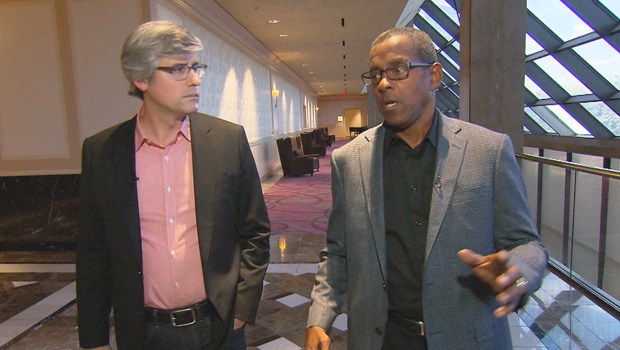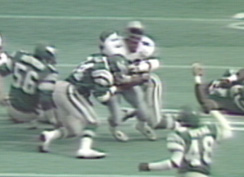Tackling the subject of football's violence
The names of this year's Super Bowl contenders will be known by the end of today's conference championship games. But the full human impact of all that action may not be known for years. Our Cover Story is reported now by Mo Rocca:
"Football has meant a lot to me," said Tony Dorsett. "It's brought me a lot of notoriety to me. It's recognition. It's made me a lot of money. It's made me a lot of friends. So it's been a great sport."
Back in the 1970s and '80s, when he was Dallas Cowboys running back number 33, Dorsett was unstoppable. His record-breaking 99-yard touchdown run in 1983 is one of most famous plays in NFL history.
A Hall of Famer, Dorsett is one of only nine players to win both college football's Heisman Trophy and a Super Bowl ring. He and the Cowboys were superstars.
"You guys were kings," said Rocca. "Royalty."
"Emperors! We ruled this city," Dorsett laughed.
But for all his fame and fortune, Tony Dorsett has paid a price. For one, "Memory, man. Places that I go to on a regular basis all of sudden I'm just wondering, 'How do I get there?' Taking my kids to school and picking them up and, 'Where do I pick 'em up?'"
He also says he became short-tempered with his wife and four children.
So in 2013 Dorsett had his brain scanned at UCLA Medical Center. The diagnosis, Dorsett said, was CTE.
The scans showed signs of chronic traumatic encephalopathy, a degenerative brain disease believed to be caused by concussions.
Last year, researchers at Boston University confirmed CTE in the brains of 87 out of 91 deceased former NFL players. Hall of Famers Junior Seau (who shot and killed himself in 2012), and the late, great Frank Gifford both had it, too.
- CTE evidence found in retired NFL players, scientists claim (CBS News, 01/23/13)
- Report: CTE diagnosed in Hall of Famer Tony Dorsett, two other living NFL players (CBS News, 11/07/13)
- Junior Seau had degenerative brain disease CTE when he committed suicide, study shows (CBS News, 01/10/13)
- Family: NFL Hall of Famer Frank Gifford had CTE (CBS News, 11/25/15)
Rocca asked Dorsett, "Are you convinced that the CTE is the result of your career in football?"
"Are you serious?" he laughed.
"I gotta ask."
"You can't be serious. Am I serious? What else would it be from? What else would it be from? Am I serious? Excuse my French, H-E-L-L, yes, I'm serious!"
The 61-year-old says violent hits from more than 20 years of playing football have left him in the fight of his life -- hits like one in 1984 against the Philadelphia Eagles (left).
"What it feels like is, there's no feeling, because when it happens you're knocked unconscious," Dorsett said. "I kind of got blindsided, so to speak, you know? The hit was, it was vicious! It was violent."
"When you were playing in high school and in college, did people even talk about concussions?" Rocca asked.
"Absolutely not. No. No, nobody talked about concussions. And then if they did, then it's like, 'Shake it off and get back out there.'"
That's just what six-year-old M.J. Kenner did. He plays for San Antonio's Tri-County Titans. After undergoing a concussion test from coaches, he got right back in the game.
"Once they looked at you and made sure you were okay, you were ready to go back in?" Rocca asked.
"Yes," replied M.J.
"And if you weren't, would you say so?"
"Yes."
Kenner's Mom, Chevonne, said she is not worried. "He's a tough kid, and he's coached well. You know, kids get hurt. I mean, kids can get hurt anywhere."
"The game of football is organized violence," said Brian Morgan, who runs the Texas Youth Football Association, which includes the Titans.
The TYFA has drawn strong criticism for its unapologetic portrayal of young kids playing tackle football on the reality show, "Friday Night Tykes."
"Our league is a very competitive league," he said. "We're not one of those leagues where everyone is going to get a trophy just because they showed up."
Despite the recent headlines about brain injuries, Morgan's league has seen a steady increase in participation. But Pop Warner -- by far America's largest youth football organization -- has seen a decline.
Rocca asked, "Do you think that there are too many parents out there that are coddling their kids, that are treating them like they're fragile objects?"
"I think so," said Morgan. "It's kind of the wussification of America sometimes. I think we're a little bit soft on our kids, and we're creating a generation of soft people."
"What does a kid as young as six years old get from playing tackle football?"
"The biggest thing they get is they get a sense of camaraderie," Morgan said. "They're really learning how to work together as a team and overcome adversity."
Sally Jenkins, a four-time National Sports Columnist of the Year for the Washington Post, is a big fan of football. "It has kind of a beauty," she said. "There's a ballet aspect to it, too."
"Is it inherently violent?
"Of course. Absolutely. It's about men moving other men out of the way head first."
But the NFL, Jenkins says, isn't taking care of its past players -- and isn't being honest with the families of its future players.
"If, as a league, you're telling them, 'Hey, it's really safe for your six-year-old and your seven-year-old and your eight-year-old to play tackle football,' then you are responsible for the number of hits those kids take from the time they are six through their NFL career," Jenkins said. "You can't just say, 'We're only responsible for what happens on the field during their NFL career,' and 'Prove that their CTE isn't a result of their grade school career or their high school career.' Bull!"
Currently, the NFL only covers health insurance during a player's career, and five years post-retirement, even though players' injuries can last a lifetime -- and sometimes don't even manifest themselves until well after retirement.
"We don't tell any other employee who goes into a dangerous profession -- we don't tell firefighters, 'If you get injured in a burning building, you have no healthcare," said Jenkins. "But for some reason in the NFL, you're on your own."
So who is picking up the tab for players' long-term healthcare? "The American taxpayer," said Jenkins, through Medicaid and Medicare.
But the biggest change, she said, needs to happen at the youth level.
"The funny thing is, there's people around the league who feel like, 'Oh my gosh, if you don't have six-year-olds playing tackle football, we won't have Peyton Mannings, or we won't have Tom Bradys," said Jenkins. "That's ludicrous. Tom Brady didn't play tackle football 'til he was in high school. What is this weird fear that if you don't have six-year-olds beating on each other, that somehow we won't be able to grow NFL football players? It's a complete fallacy!"
Archie Manning, who starred for the New Orleans Saints in the 1970s and '80s, is the father of Super Bowl-winning quarterbacks Peyton, and Eli, who played non-tackle flag football as a kid.
He told Rocca his boys were in seventh grade when they first played organized tackle football: "I think you can wait on the contact and the tackling. I think there's plenty of time for that."
"Can you learn all the skills that you need with flag football, or are you missing out somehow?" Rocca asked.
"No. I think at a young age you learn plenty."
But Manning says pro football has done a good job addressing the concussion issue with new rules and better equipment, which the NFL -- in its own study -- says have reduced concussions 35 percent.
"I think a lot, a lot has been done in the last three or four years to make the game safe at every level," Manning said.
But Sally Jenkins believes the NFL and team owners could easily to do more. "You're not going to take neurological disease out of the equation" she said. "But what you can do is mitigate and palliate. And if that means that it's a lot less profitable for Bob Kraft, or a Tisch, a Lurie or a York, tough!
"If concussions are the black lung of football, we've got to do something about that, to make sure that people with black lung and their families are cared for. "I think the moral solution here is to create the equivalent of a Coal Act for football, and say, 'If you want to do business in this industry, you have to agree to take care of the workers in this industry'"
"The NFL can't want federal oversight?" asked Rocca.
"Oh, no!" Jenkins laughed. "That is the thing they are most afraid of."
Tony Dorsett didn't know the toll all of those hits would take on him. But someone, he says, DID know. "Management knew way before players on what the damage that was being done to players," he said.
"You think management at the pro level?"
"Yes, yes. From my knowledge, yes, they knew about it way before the players knew it."
"And the long-term effects?"
"Exactly."
We asked the Dallas Cowboys about player safety, and Dorsett's assertions. They told us that -- since no one from Dorsett's era is still with team management -- it would "not be appropriate" to comment.
As for the NFL, they declined to speak with us on-camera, but issued a statement that they "welcome any conversation about player health and safety."
"I never thought that I would be going through what I'm going through right now because of playing football," Dorsett said. "I just thought I'd just be retired, like mom and pops. Just enjoying life."
Rocca asked, "When you look back on your career, would you do it all again?"
"Absolutely," he replied.
- Cowboys great Tony Dorsett trying controversial stem-cell treatment (CBS News, 11/05/15)
For more info:

